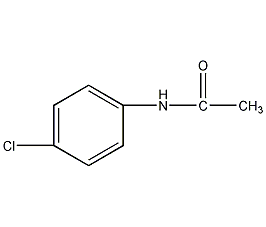
Structural formula
| Business number | 05JM |
|---|---|
| Molecular formula | C8H8 ClNO |
| Molecular weight | 169.61 |
| label |
Acetic acid 4-chloroanilide, 4′-Chloroacetanilide |
Numbering system
CAS number:539-03-7
MDL number:MFCD00000612
EINECS number:208-707-8
RTECS number:AE1001000
BRN number:509638
PubChem number:24856828
Physical property data
1. Characteristics: Undetermined
2. Density (g/ cm3, 25/4℃): 1.385
3. Relative steam Density (g/cm3, air=1): Undetermined
4. Melting point (ºC): 176-178
5. Boiling point (ºC , normal pressure): 333
6. Boiling point (ºC, 8kPa): Undetermined
7. Refractive index: Undetermined
8. Flash point ( ºC): 333
9. Specific rotation (º): Undetermined
10. Autoignition point or ignition temperature (ºC): Undetermined
11. Vapor pressure (kPa, 25ºC): Undetermined
12. Saturation vapor pressure (kPa, 55.1ºC): Undetermined
13. Heat of combustion (KJ/mol): Undetermined
14. Critical temperature (ºC): Undetermined
15. Critical pressure (KPa): Undetermined
16. Oil and water (octanol/ Log value of the distribution coefficient (water): Undetermined
17. Explosion upper limit (%, V/V): Undetermined
18. Explosion lower limit (%, V/V): Undetermined
19. Solubility: soluble in water
Toxicological data
1. Acute toxicity: Rat intraperitoneal LD50: 245mg/kg, total nutritional and metabolic value-body temperature decrease;
Mouse intraperitoneal LD50: 730mg/kg, no details except lethal dose Description;
2. Mutagenicity data: Microbial body TEST system mutation: Bacteria – Salmonella typhimurium: 2500ug/plate;
Ecological data
This substance may be harmful to the environment, and special attention should be paid to water bodies.
Molecular structure data
1. Molar refractive index: 45.41
2. Molar volume (cm3/mol): 134.4
3. Isotonic specific volume (90.2K ): 346.8
4. Surface tension (dyne/cm): 44.2
5. Polarizability (10-24cm3): 18.00
Compute chemical data
1. Reference value for hydrophobic parameter calculation (XlogP): None
2. Number of hydrogen bond donors: 1
3. Number of hydrogen bond acceptors: 1
4. Number of rotatable chemical bonds: 1
5. Number of tautomers: 3
6. Extension�Molecular polar surface area 29.1
7. Number of heavy atoms: 11
8. Surface charge: 0
9. Complexity: 141
10. Number of isotope atoms: 0
11. Number of determined atomic stereocenters: 0
12. Number of uncertain atomic stereocenters: 0
13. Determine the number of stereocenters of chemical bonds: 0
14. Uncertain number of stereocenters of chemical bonds: 0
15. Number of covalent bond units: 1
Properties and stability
Use and store according to specifications, no decomposition will occur, and avoid contact with oxides
Storage method
Stored in a cool, dry and well-ventilated warehouse. Keep away from fire and heat sources. Protect from direct sunlight. The packaging is sealed. They should be stored separately from acids and food chemicals, and avoid mixed storage. Suitable materials should be available in the storage area to contain spills.
Synthesis method
None yet
Purpose
Used as organic synthesis and dye intermediates.

 微信扫一扫打赏
微信扫一扫打赏

